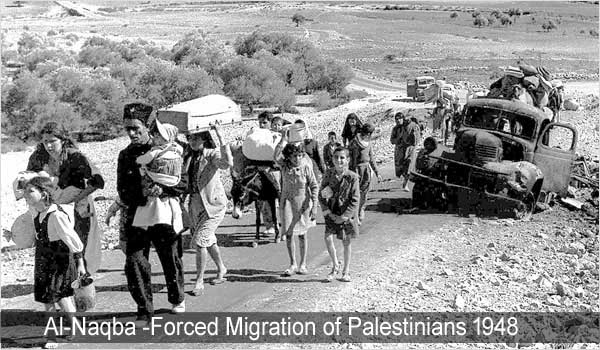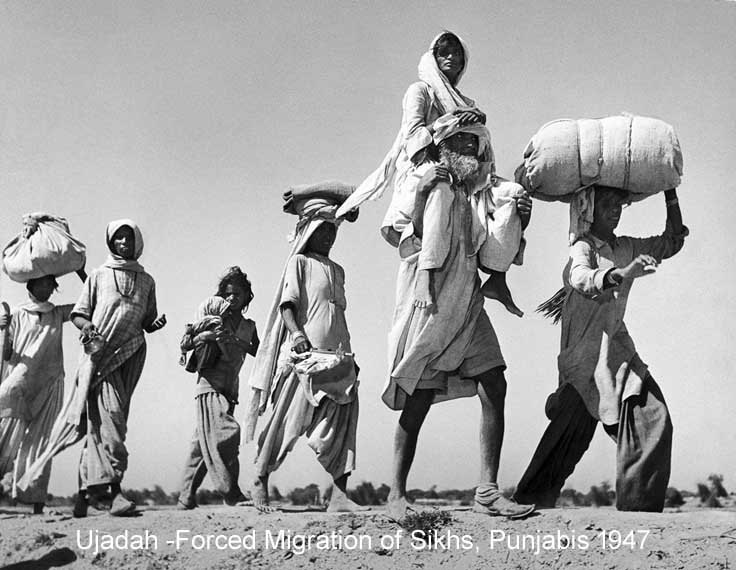Israel’s war against Gaza, Hamas & the criminal silence in India
Why is the Sikh community not speaking out in clear terms about a people rendered homeless via Partition in 1948? While the war in West Asia rages and Israel continues to pound the civilian population of Gaza on the pretext of finishing off Hamas, it is surprising that the Sikh community has preferred to maintain a rather stoic silence on the issue. The Narendra Modi-led right-wing Indian government’s support for Israel and disdain for Palestine dovetails into and is an extension of its well-known hatred for Muslims. Why is the Sikh leadership unable to see a great resonance between what happened to Punjab in 1947 and to Palestinians in 1948, argues senior journalist SP Singh through a 2-series debate televised recently on the Daleel show.
![Why is the Sikh community not speaking out in clear terms about a people rendered homeless via Partition in 1948? While the war in West Asia rages and Israel continues to pound the civilian population of Gaza on the pretext of finishing off Hamas, it is surprising that the Sikh community has preferred to maintain a rather stoic silence on the issue. The Narendra Modi-led right-wing Indian government’s support for Israel and disdain for Palestine dovetails into and is an extension of […]](https://www.theworldsikhnews.com/wp-content/uploads/2023/10/Hamas-attack-360x267.jpg)
The World Sikh News brings you to these two debates, both moderated by senior journalist SP Singh, on West Asia. While the first one features a senior journalist who covered West Asia for many years and a scholar of history who lived and studied in Jerusalem, the second debate focusses on the linkages between Indian politics and the West Asian conflict. It features scholar-par-excellence Prof Apoorvanand, often referred to as the chronicler of India’s liberal conscience, and Prof Mohd Khalid, a well-known political commentator and expert in India-Israel relations.
You do not have to be an academic expert in sub-continental history to know that the receding colonial power in the heady days after the Second World War left behind the tragedy of Partition in two territories — the Indian subcontinent and Palestine – creating in the process two states on the basis of religion: Pakistan and Israel.
The Palestinians suffered Naqba–genocidal killings – while Punjabis on both sides of the Radcliffe Line witnessed the most barbaric and widespread massacres along religious lines.
It should have come naturally to Sikhs, as also to all Punjabis and right-thinking people anywhere, that of the many other humanitarian reasons to speak up, the prime one for them was the clear realization that Palestinians are a colonised group of people living under a severe, brutal military occupation, fighting for generations to get their homeland.

India’s initial policy towards Israel witnessed in 1947 was rather clear. At the time, the Indian national movement, represented the Congress opposed the partition of Palestine and the creation of the state of Israel.
The policy of Modi’s political ancestors was extremely troublesome. It is only too well known and documented that V D Savarkar admired Nazism, though Israelis may not like that now, no matter how muchsoever they admire Modi and the BJP. Mr B.S Moonje, president of the Hindu Mahasabha (1927- 1937) even travelled to Italy, and met Mussolini (See Vajpayee: Ascent of the Hindu Right by Abhishek Choudhary, page 20).

The saffron tradition continues. While PM Modi was quick to jump into the Israeli side of the arena with his tweet, a poisonous creature like YatiNarsinghanand has even issued a video message, stating his wish to settle down in Israel and fight the enemy, claiming it is the same enemy that India faces. How difficult is it to understand who is being called an enemy? (Hint: This man had served jail time for making speeches calling for the genocide of Indian Muslims.)
Forces that stood with Hitler are today claiming to be standing by Israel. Israel’s Consulate General to Mumbai Kobbi Shoshani has said that when leaders like PM Modi support Israel, it gives Israel a lot of power.
Forces that stood with Hitler are today claiming to be standing by Israel. Israel’s Consulate General to Mumbai Kobbi Shoshani has said that when leaders like PM Modi support Israel, it gives Israel a lot of power.
India, clearly, has changed its stance under the influence of saffron. It was reluctant to recognise Israel and did so only after Iran and Turkey did. It did not back Israel during the 1956 Suez crisis or the Six-Day War with Palestine in 1967 or the 1973 Yom Kippur War, or the 2006 Lebanon War.
All that changed after 2014. In 2015 and 2016, India abstained from the UN vote that would have forced Israel to face charges of war crimes at the International Criminal Court. (Significantly, India had voted against Israel and in favour of the UNHRC resolution in July 2014 that had instituted this very inquiry report into the Gaza violence in which more than 2,300 had been killed in Israeli airstrikes on Gaza.)
In 2017, PM Modi became the first Indian PM to ever visit Israel, thus underlining the ideological alignment of BJP with Netanyahu’s right-wing Likud Party and its alliance with ultranationalist groups.
Today, the West Asian conflict is panning out in the Indian political arenas and mindspace. It is being seen as a war launched by Israel on Muslims.
Today, the West Asian conflict is panning out in the Indian political arenas and mindspace. It is being seen as a war launched by Israel on Muslims. Talk about Israel versus Hamas is permeating into the election campaign and is becoming part of the same divisive framework that incites mobs to target minorities and indulge in lynchings.
It is time regional parties spoke out against India’s stance, questioned Israel’s attacks on the civilian population of Gaza, and backed the Palestinians’ legitimate aspirations to have their homeland where they can enjoy freedom and self-rule.
It is time regional parties spoke out against India’s stance, questioned Israel’s attacks on the civilian population of Gaza, and backed the Palestinians’ legitimate aspirations to have their homeland where they can enjoy freedom and self-rule.
A community wanting and advocating the same rights for itself cannot remain silent about what Palestinians are going through today, not just in Gaza but also in the West Bank. Punjab needs to educate the rest of India that history did not begin on October 7, 2023, when Hamas launched its surprise attack on Israel. The history of pushing an entire nation against the wall goes much, much deeper.
The Sikh community wanting and advocating the same rights for itself cannot remain silent about what Palestinians are going through today, not just in Gaza but also in the West Bank.
Silence will be collusion, and not questioning our own politicians in Punjab, particularly those claiming to represent the Sikh community, will be criminal negligence.
Rivers of Blood in the Land of Ten Commandments!
Talking Israel & Hamas – The War In Gaza & the Emerging Situation in West Asia
- Dr Harsh Dobhal, Former West Asia Correspondent, PTI & scholar at Hebrew University of Jerusalem; Media expert
- Dr VikasRathee, Historian; formerly Post-Doctoral Fellow at Hebrew University of Jerusalem
- Prof Manjit Singh, Sociologist & Activist; expert on Exclusion of the Marginalised from Power Structures
The war in West Asia and the battle for India’s soul & Indians’ votes –
The criminal silence of India’s political leadership over framing the conflict as part of divisive politics of hate.
In conversation with Prof Apoorvanand and Prof Mohd Khalid.
We live in testing times and such times require us to stand up to injustice unequivocally!
